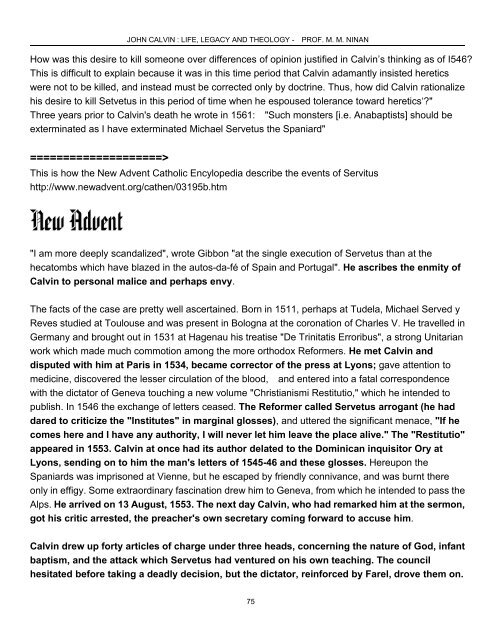Create successful ePaper yourself
Turn your PDF publications into a flip-book with our unique Google optimized e-Paper software.
JOHN CALVIN : LIFE, LEGACY AND THEOLOGY -<br />
PROF. M. M. NINAN<br />
How was this desire to kill someone over differences of opinion justified in <strong>Calvin</strong>’s thinking as of I546?<br />
This is difficult to explain because it was in this time period that <strong>Calvin</strong> adamantly insisted heretics<br />
were not to be killed, <strong>and</strong> instead must be corrected only by doctrine. Thus, how did <strong>Calvin</strong> rationalize<br />
his desire to kill Setvetus in this period of time when he espoused tolerance toward heretics‘?"<br />
Three years prior to <strong>Calvin</strong>'s death he wrote in 1561: "Such monsters [i.e. Anabaptists] should be<br />
exterminated as I have exterminated Michael Servetus the Spaniard"<br />
====================><br />
This is how the New Advent Catholic Encylopedia describe the events of Servitus<br />
http://www.newadvent.org/cathen/03195b.htm<br />
"I am more deeply sc<strong>and</strong>alized", wrote Gibbon "at the single execution of Servetus than at the<br />
hecatombs which have blazed in the autos-da-fé of Spain <strong>and</strong> Portugal". He ascribes the enmity of<br />
<strong>Calvin</strong> to personal malice <strong>and</strong> perhaps envy.<br />
The facts of the case are pretty well ascertained. Born in 1511, perhaps at Tudela, Michael Served y<br />
Reves studied at Toulouse <strong>and</strong> was present in Bologna at the coronation of Charles V. He travelled in<br />
Germany <strong>and</strong> brought out in 1531 at Hagenau his treatise "De Trinitatis Erroribus", a strong Unitarian<br />
work which made much commotion among the more orthodox Reformers. He met <strong>Calvin</strong> <strong>and</strong><br />
disputed with him at Paris in 1534, became corrector of the press at Lyons; gave attention to<br />
medicine, discovered the lesser circulation of the blood, <strong>and</strong> entered into a fatal correspondence<br />
with the dictator of Geneva touching a new volume "Christianismi Restitutio," which he intended to<br />
publish. In 1546 the exchange of letters ceased. The Reformer called Servetus arrogant (he had<br />
dared to criticize the "Institutes" in marginal glosses), <strong>and</strong> uttered the significant menace, "If he<br />
comes here <strong>and</strong> I have any authority, I will never let him leave the place alive." The "Restitutio"<br />
appeared in 1553. <strong>Calvin</strong> at once had its author delated to the Dominican inquisitor Ory at<br />
Lyons, sending on to him the man's letters of 1545-46 <strong>and</strong> these glosses. Hereupon the<br />
Spaniards was imprisoned at Vienne, but he escaped by friendly connivance, <strong>and</strong> was burnt there<br />
only in effigy. Some extraordinary fascination drew him to Geneva, from which he intended to pass the<br />
Alps. He arrived on 13 August, 1553. The next day <strong>Calvin</strong>, who had remarked him at the sermon,<br />
got his critic arrested, the preacher's own secretary coming forward to accuse him.<br />
<strong>Calvin</strong> drew up forty articles of charge under three heads, concerning the nature of God, infant<br />
baptism, <strong>and</strong> the attack which Servetus had ventured on his own teaching. The council<br />
hesitated before taking a deadly decision, but the dictator, reinforced by Farel, drove them on.<br />
75

















